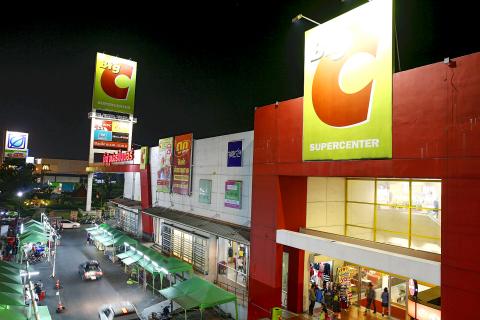Casino Guichard-Perrachon SA agreed to sell its stake in Thai supermarket chain Big C Supercenter Pcl for 3.1 billion euros (US$3.5 billion) to reduce borrowings after short-seller Carson Block attacked the French retailer’s accounting for allegedly understating its debt.
TCC Holding Co, controlled by Thailand’s richest man, Charoen Sirivadhanabhakdi, agreed to buy the controlling stake for 252.88 baht a share, Casino said in an e-mailed statement on Sunday. The offer is 11 percent higher than the Thai grocer’s closing price on Friday last week and represents a 28 percent premium to Jan. 14, just before Casino said it planned a sale.
Big C shares jumped 9.3 percent to 248 baht at 10:44am on Monday in Bangkok, poised for the highest close in a year. The deal cuts Casino’s debt in half and puts it well on track to reach its goal of raising 4 billion euros through asset sales this year, chief financial officer Antoine Giscard-D’Estaing said.

Photo: Reuters
Casino is “very confident that it can execute the debt-reduction plan completely or even exceed the goal,” Giscard-D’Estaing said in a phone interview.
Block’s Muddy Waters LLC has said that Casino is using financial engineering to mask a sharply deteriorating core business. It also said Standard & Poor’s has understated the retailer’s “dangerously” high debt burden. Casino has rejected the claims, saying it has a solid financial structure and that it may take legal action against Muddy Waters.
Big C runs more than 700 stores, ranging from hypermarkets to convenience shops.
Shares of Berli Jucker Pcl, a Thai consumer goods distributor controlled by Charoen, surged 15 percent yesterday to 38 baht, on track for the biggest gain since June 2010. Univentures Pcl, a property developer part-owned by the billionaire, rose 4.9 percent while Charoen-backed Golden Land Property Development Pcl gained 5.7 percent.
The French retailer said the transaction will reduce debt by 3.3 billion euros, including Big C’s borrowings. Casino said it expects to complete the transaction by March 31. Central Group, backed by Thailand’s Chirathivat family, had also been weighing a bid for the stake, people with knowledge of the matter said last month.
S&P said last month Casino’s “BBB-” long-term rating is on negative watch as its profitability will continue to be fairly weak for an extended period of time and its debt levels, primarily located at the French operations, are too high. The rating may be cut as much as two levels, according to S&P.

IN THE AIR: While most companies said they were committed to North American operations, some added that production and costs would depend on the outcome of a US trade probe Leading local contract electronics makers Wistron Corp (緯創), Quanta Computer Inc (廣達), Inventec Corp (英業達) and Compal Electronics Inc (仁寶) are to maintain their North American expansion plans, despite Washington’s 20 percent tariff on Taiwanese goods. Wistron said it has long maintained a presence in the US, while distributing production across Taiwan, North America, Southeast Asia and Europe. The company is in talks with customers to align capacity with their site preferences, a company official told the Taipei Times by telephone on Friday. The company is still in talks with clients over who would bear the tariff costs, with the outcome pending further

WEAKER ACTIVITY: The sharpest deterioration was seen in the electronics and optical components sector, with the production index falling 13.2 points to 44.5 Taiwan’s manufacturing sector last month contracted for a second consecutive month, with the purchasing managers’ index (PMI) slipping to 48, reflecting ongoing caution over trade uncertainties, the Chung-Hua Institution for Economic Research (CIER, 中華經濟研究院) said yesterday. The decline reflects growing caution among companies amid uncertainty surrounding US tariffs, semiconductor duties and automotive import levies, and it is also likely linked to fading front-loading activity, CIER president Lien Hsien-ming (連賢明) said. “Some clients have started shifting orders to Southeast Asian countries where tariff regimes are already clear,” Lien told a news conference. Firms across the supply chain are also lowering stock levels to mitigate

NEGOTIATIONS: Semiconductors play an outsized role in Taiwan’s industrial and economic development and are a major driver of the Taiwan-US trade imbalance With US President Donald Trump threatening to impose tariffs on semiconductors, Taiwan is expected to face a significant challenge, as information and communications technology (ICT) products account for more than 70 percent of its exports to the US, Chung-Hua Institution for Economic Research (CIER, 中華經濟研究院) president Lien Hsien-ming (連賢明) said on Friday. Compared with other countries, semiconductors play a disproportionately large role in Taiwan’s industrial and economic development, Lien said. As the sixth-largest contributor to the US trade deficit, Taiwan recorded a US$73.9 billion trade surplus with the US last year — up from US$47.8 billion in 2023 — driven by strong

RESHAPING COMMERCE: Major industrialized economies accepted 15 percent duties on their products, while charges on items from Mexico, Canada and China are even bigger US President Donald Trump has unveiled a slew of new tariffs that boosted the average US rate on goods from across the world, forging ahead with his turbulent effort to reshape international commerce. The baseline rates for many trading partners remain unchanged at 10 percent from the duties Trump imposed in April, easing the worst fears of investors after the president had previously said they could double. Yet his move to raise tariffs on some Canadian goods to 35 percent threatens to inject fresh tensions into an already strained relationship, while nations such as Switzerland and New Zealand also saw increased